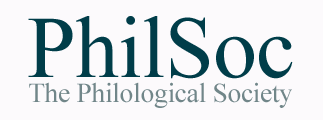Master’s Bursary Scheme – 2024 Competition (for the academic year 2024–25)
The Philological Society is pleased to offer up to 5 bursaries for students embarking on a taught postgraduate programme in the UK in the areas of linguistics or philology, in accordance with our mission:
to investigate and promote the study and knowledge of the structure, the affinities, and the history of languages. As well as encouraging all aspects of the study of language, PhilSoc has a particular interest in historical and comparative linguistics, and maintains its traditional interest in the structure, development, and varieties of Modern English.
One bursary, the Anna Morpurgo Davies Master’s Bursary, is normally awarded to someone working on Ancient Languages (including non-Indo-European ones).
The intention is that the bursaries will make a contribution to maintaining and furthering the breadth and diversity of language-study in the UK by providing support for outstanding young scholars in the field.
Bursaries up to the value of £15,000 each may be awarded, which may be used for either fees or maintenance. A bursary will not be granted to anyone who has full fees and maintenance from any other source, but it may be used to supplement another award which covers only fees. Candidates must inform the Philological Society if they receive any other award(s) towards study on the programme. The Society will not consider repeat applications from people who have already received a Master’s bursary from the Society in the past.
Candidates will normally possess or expect to be awarded a first-class honours degree or equivalent. All candidates must have been accepted or provisionally accepted onto a full-time Master’s programme at a United Kingdom university in the fields of philology or linguistics. In the case of candidates who have not yet received their first degree, a provisional offer may be made. Priority will be given to applicants on a one year Master's course. Applicants already enrolled in and part way through a two year course may apply but will be held to a commensurately higher standard.
Applications and references must be uploaded to the Society’s Online Portal. Anything sent by any other means will not be accepted. Candidates must have two referees and are advised to inform these referees in advance of their intention to submit their names as referees. Notes for referees can be found at the end of this announcement.
The deadline for submitting applications AND references is 5.00pm BST on 3rd June 2024. These CANNOT be uploaded after that time and NO EXCEPTIONS will be made. Correspondence about late submissions will not be entertained. Applicants are strongly advised to submit their application well in advance to give their referees sufficient time to prepare and submit their references.
Applications will be assessed by a panel of members of the Society’s Council. The decisions of the panel will be final.
All candidates will be notified of the outcome of their application in early August 2024.
Successful candidates will receive their bursary later in the summer. They will be expected to inform the Society of the outcome of their studies and their future plans (employment, research degree) in February 2025 and in due course to contribute a 500-word article on their areas of interest for our blog.
* * *
NOTES FOR REFEREES
Please read the notes above about how to submit your reference and the deadline for doing so. In your reference, please include comments on the following points:
- Quality of Work: Please provide a realistic assessment of the applicant’s abilities, based on the quality of their academic and/or professional performance to date, providing evidence to support your comments. Please indicate how this candidate compares with other students in your experience. Please indicate your relationship with the applicant (module teacher, dissertation supervisor, course co-ordinator etc.).
- Undergraduate performance. Please provide an explanation of the applicant’s examination marks, e.g. what proportion gain firsts, whether the final-year marks are based just on that year, what level of supervision any dissertation has received etc. Please also indicate whether the candidate is in the top 5%, 10%, 20%, or below in the cohort, and also the size of the cohort. If there is a first-degree examination result outstanding, please provide some indication of the class of degree that you expect this candidate to obtain and why.
- Potential for postgraduate study. Please give your opinion on this candidate’s academic and personal suitability for the proposed course of study and their potential to complete the programme. Please also comment, where appropriate, on any future plans for further research the student might have.

